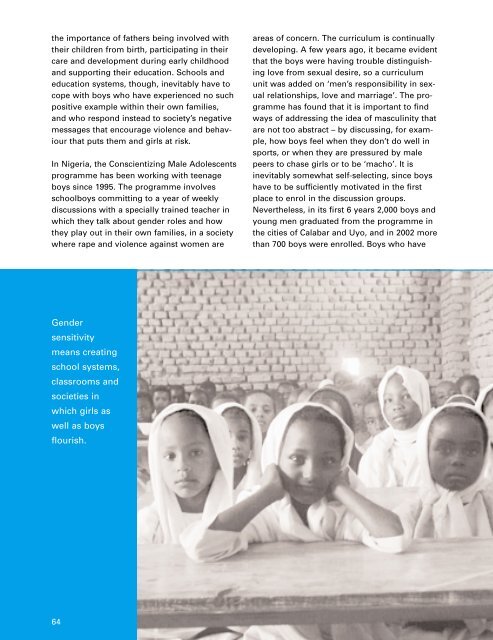THE STATE OF THE WORLD'S CHILDREN 2004 - Unicef
THE STATE OF THE WORLD'S CHILDREN 2004 - Unicef
THE STATE OF THE WORLD'S CHILDREN 2004 - Unicef
You also want an ePaper? Increase the reach of your titles
YUMPU automatically turns print PDFs into web optimized ePapers that Google loves.
the importance of fathers being involved with<br />
their children from birth, participating in their<br />
care and development during early childhood<br />
and supporting their education. Schools and<br />
education systems, though, inevitably have to<br />
cope with boys who have experienced no such<br />
positive example within their own families,<br />
and who respond instead to society’s negative<br />
messages that encourage violence and behaviour<br />
that puts them and girls at risk.<br />
In Nigeria, the Conscientizing Male Adolescents<br />
programme has been working with teenage<br />
boys since 1995. The programme involves<br />
schoolboys committing to a year of weekly<br />
discussions with a specially trained teacher in<br />
which they talk about gender roles and how<br />
they play out in their own families, in a society<br />
where rape and violence against women are<br />
areas of concern. The curriculum is continually<br />
developing. A few years ago, it became evident<br />
that the boys were having trouble distinguishing<br />
love from sexual desire, so a curriculum<br />
unit was added on ‘men’s responsibility in sexual<br />
relationships, love and marriage’. The programme<br />
has found that it is important to find<br />
ways of addressing the idea of masculinity that<br />
are not too abstract – by discussing, for example,<br />
how boys feel when they don’t do well in<br />
sports, or when they are pressured by male<br />
peers to chase girls or to be ‘macho’. It is<br />
inevitably somewhat self-selecting, since boys<br />
have to be sufficiently motivated in the first<br />
place to enrol in the discussion groups.<br />
Nevertheless, in its first 6 years 2,000 boys and<br />
young men graduated from the programme in<br />
the cities of Calabar and Uyo, and in 2002 more<br />
than 700 boys were enrolled. Boys who have<br />
Gender<br />
sensitivity<br />
means creating<br />
school systems,<br />
classrooms and<br />
societies in<br />
which girls as<br />
well as boys<br />
flourish.<br />
64
















